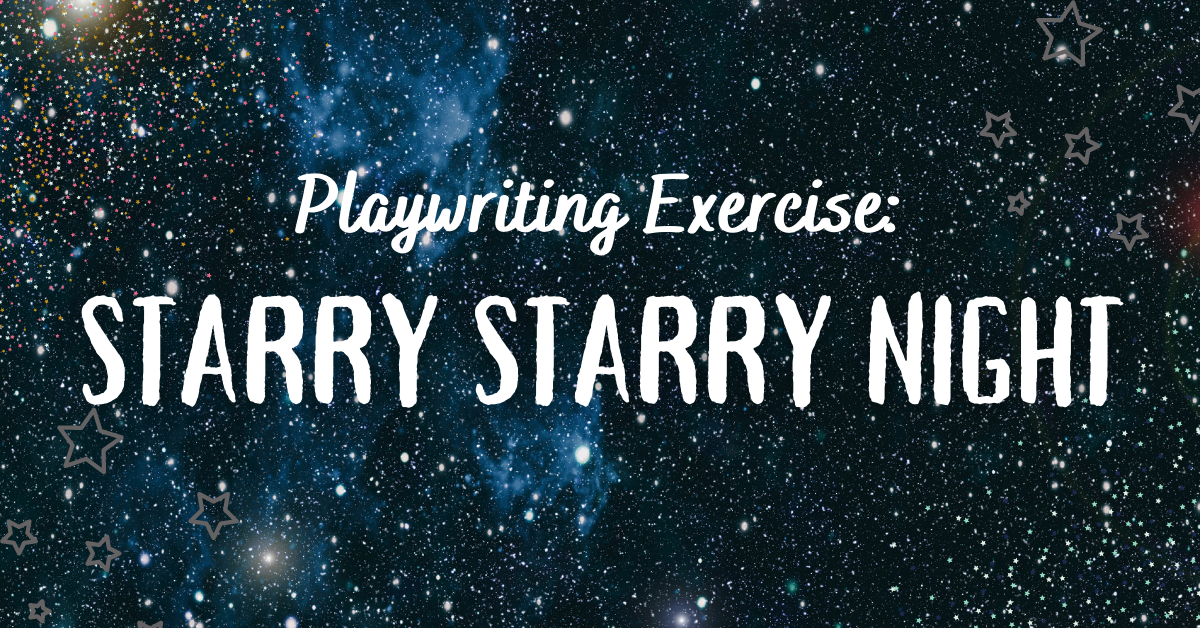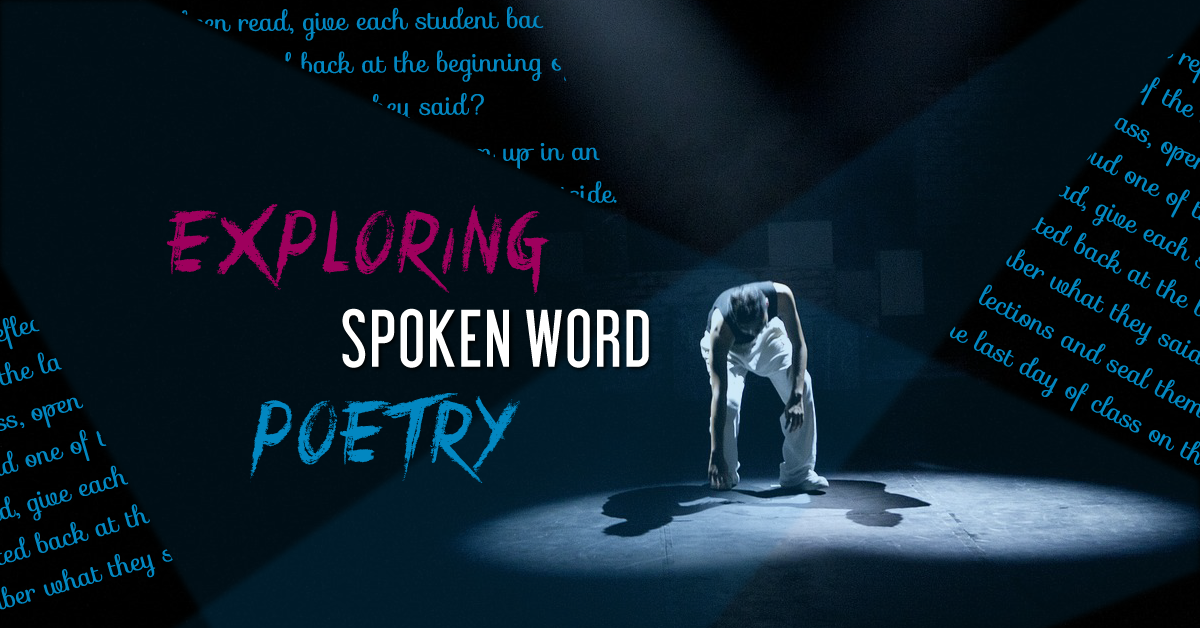Chicken Road: Talking to the cast before the show
Listowel District Secondary School took my brand new play (look for it to come out in May!) Chicken. Road. to their District Sears Festival. The play deals with the old joke “Why did the Chicken cross the road…. to get to the other side” in the context of a teen who commits suicide by throwing themselves in front of a semi truck. The play combines some abstract swift paced dialogue with very realistic monologues, and a lot of chicken squawking – a great challenge for the high school actor. This particular production found wonderful physical inspiration in the text by incorporation actual chicken movements, and subtly chicken inspired costumes. They started as chickens and over time became more and more human which made the intense subject matter all the more powerful. This is not suggested in the script, only abstractly alluded to, so I was not expecting this interpretation.
I talk to the cast after their tech but before they perform for an audience. Note that there are many references to the cast performing AS chickens, that completely went over my head. I had no idea what I was about to see…..
Transcript
Lindsay: Well, I have in front of me Listowel District Secondary School and they are premiering my play, Chicken Road, tonight.
Cast: Wooh!
Lindsay: At the Perth-Huron District of the Sears Drama Festival. Very exciting.
And you’ve just had your tech run, how’d it go?
Cast: Awesome!
Lindsay: Very good, very good.
Now, we have established in conversation and when you guys did the workshop at Listowel that Chicken Road is a bit of a strange play. But, first off, someone tell me what Chicken Road is all about.
Girl 1: Well, Chicken Road is a play that was written in order to deal with the issue of suicide in teens and it’s represented through chickens in the question that, “Why did the chicken cross the road?” It gives you an interesting perspective on why people do it and how you can expect them sometimes to do it…
Lindsay: And that you don’t know what people, when they’re thinking about it, you don’t know what goes in their heads.
Girl 1: Yes.
Lindsay: And we sort of relate that all to the very old chestnut of a joke, “Why did the chicken cross the road?” And does the chicken think about crossing the road and what is going on inside their head.
So, name a couple of things for me about why it is so strange this play.
Boy 1: Well, first off, there’s different types of speeds going on throughout the play with the dialogue. You have your long monologue blocks where it’s one person, usually the isolated talking, and then, there’s also the quick-paced one or two lines that go back and forth really quickly between…
Lindsay: Yeah, lots of different variety, and what else?
Boy 2: There’s also multiple conversations that go on. It’s not just one person talking to another. It’s like one person talking to the other while somebody’s talking to somebody else.
Lindsay: That overlap, was that difficult to sort of get a handle on?
Cast: Yeah.
Lindsay: Yeah?
Girl 2: Especially where the choppy ones that I would just, like, random lines that you have to get used to. It’s more like you have to know where exactly they’re coming in.
Lindsay: And I understand there was some memorization, interesting memorization things.
So, what tricks did you use to memorize, help you memorize?
Girl: Drill it.
Lindsay: Drill?
Cast: Drill.
Girl 1: And writing people’s names in the chicken’s numbers so you remember their voices when they say the line.
Lindsay: Ah! That’s very interesting and also, too, just in terms of names, what are their character names in this play?
Girl 1: Numbers!
Boy: They’re all numbers.
Lindsay: That’s right! So, was that hard in terms of developing characters? Wasn’t that thing to grab onto initially because you are numbers instead of names? Some yes, some no. So, how did you deal with that?
Lady: I think it came out, well, to me, having read it a lot before I came out there. But I think for you guys it started to come out as we moved with each other and drilled it more, we started to see more of what this number is thinking and what this number is thinking, and then, the numbers just became…
Lindsay: People.
Lady: …it became one with people.
Lindsay: Well, that was my hope, was that even though it was a very specific choice on my end to make them numbers, but that each number has a very specific feeling about the situation that they’re in, a very specific attitude towards the young man who committed suicide, and just about suicide in general. I hope that came through in the text, that everybody thinks a specific way, yes?
Cast: Yeah.
Lindsay: Awesome. We like that. So, what was the most… We think that the lines, I think, were probably the most challenging for you guys. So, what was the most fun? Like, what did you like about this play? I hope there’s something.
Girl 1: Bawk bawk bawk!
Girl 3: Getting in touch with our inner chicken.
Boy 2: I really loved the diversity of the characters. It wasn’t just, like, a whole bunch of simple-minded people. They were coming at it from a whole bunch of different angles. It wasn’t just this person knew him because of this when so did these other people the exact same way. But, because you had, like, friends, people that didn’t know him, and people that were, like, really, really close to him their entire lives and they still didn’t get it.
Lindsay: Yeah, very nice. Cool.
Lady: I think we’ve had some fun with movement, right?
Cast: Yeah!
Lady: A little bit with movement.
Girl 3: A little bit of muscle spasms.
Lindsay: That’s good. I like that, too. And, how did you guys do… Because, oh, another interesting thing for me was to kind of throw that movement section in the beginning. How did you guys deal with that? What did that say to you? Why do you think it was there?
Girl: Probably different emotions.
Lindsay: Yeah.
Lady: Yeah, emotions did come out during that – do come out during that, yup. The Road is, like, another character.
Lindsay: Ah, I like that. Absolutely.
Lady: Always there watching.
Boy 2: I think it’s also to almost understand the characters more and what they’re talking about.
Lindsay: Yeah.
Girl 4: And know that everybody’s really, really, confused about what just happened.
Lindsay: Nice. I like that very much. Excellent.
If you were going to give some piece of advice to another school doing this play, what would be the one thing that you would say?
Girl 3: Stretch before doing…
Lindsay: Stretching, always important. One more piece of advice? Oh!
Girl 1: Set a deadline for learning your lines and keep that deadline!
Lindsay: Perfect, perfect. All right!
So, I’m very excited to see your show tonight and I know you guys are going to do a fantastic job. Thank you!
Cast: Thank you! Whoa!



